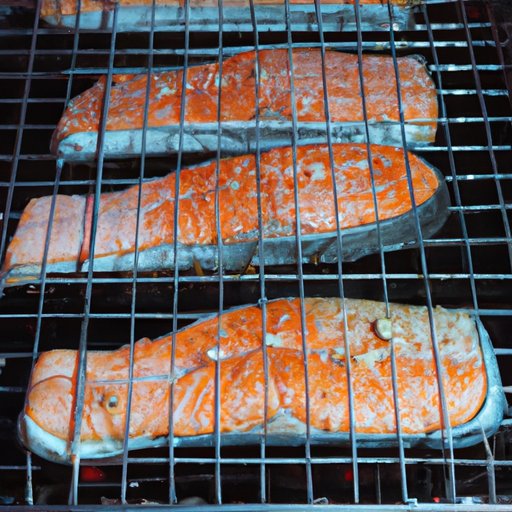Introduction
Grilled salmon is a delicious and nutritious meal option. It’s packed with essential nutrients, including omega-3 fatty acids, vitamins and minerals, and protein. Eating grilled salmon on a regular basis may offer various health benefits, such as improved cardiovascular health and reduction in inflammation. However, grilled salmon may also contain contaminants such as mercury, which can be harmful to your health. In this article, we’ll explore the nutritional benefits and potential risks of eating grilled salmon.
Exploring the Nutritional Benefits of Grilled Salmon
Salmon is an excellent source of essential nutrients. It’s rich in omega-3 fatty acids, which are important for brain development and function. Salmon is also high in vitamins and minerals, such as vitamin B6, vitamin B12, niacin, selenium, and phosphorus. Additionally, salmon is a great source of protein, providing 23 grams of protein per 3-ounce serving.

The Health Benefits of Eating Grilled Salmon on a Regular Basis
Eating grilled salmon on a regular basis may offer various health benefits. Omega-3 fatty acids found in salmon may help reduce inflammation, improve cardiovascular health, and even boost cognitive performance. Studies have shown that people who eat more fish, like salmon, tend to have lower rates of heart disease, stroke, and other conditions related to poor cardiovascular health. The anti-inflammatory properties of omega-3 fatty acids may also help reduce symptoms of inflammatory conditions, such as arthritis and asthma.
Omega-3 fatty acids may also help improve cognitive performance, particularly in older adults. Studies have shown that omega-3 fatty acids may help protect against age-related mental decline, including Alzheimer’s disease. Additionally, omega-3 fatty acids have been linked to improved mood, better sleep, and reduced anxiety.
Is Grilled Salmon Better for You Than Other Cooking Methods?
When it comes to cooking salmon, grilling is one of the healthiest methods. Grilling helps preserve the nutrients in salmon, while other cooking methods, such as frying or baking, can reduce the nutritional value of the fish. When grilling salmon, it’s important to avoid overcooking, as this can cause the fish to become dry and tough. Additionally, it’s best to use a low-fat marinade or oil when grilling salmon, as this will help minimize the formation of carcinogens.
What Are the Potential Risks of Eating Grilled Salmon?
Despite its many health benefits, there are some potential risks associated with eating grilled salmon. One potential risk is contamination with mercury. Mercury is a toxic metal that can accumulate in fish, including salmon, over time. Long-term exposure to high levels of mercury can lead to serious health problems, such as neurological and reproductive issues. While the risk of mercury contamination is low, it’s important to limit your consumption of large fish, such as tuna and swordfish, which may contain higher levels of mercury.
Another potential risk of eating grilled salmon is the risk of foodborne illness. Bacteria, such as Salmonella, can contaminate raw or undercooked fish. To reduce the risk of foodborne illness, it’s important to purchase fresh, high-quality salmon and cook it to an internal temperature of 145°F (63°C). Additionally, it’s important to follow proper food safety protocols, such as washing your hands and surfaces before and after handling raw fish.

How to Prepare Grilled Salmon for Maximum Nutritional Benefits
To get the most out of grilled salmon, it’s important to choose the right type of salmon and prepare it properly. When shopping for salmon, look for wild-caught salmon, as this is generally higher in omega-3 fatty acids and other nutrients than farmed salmon. Additionally, opt for fresh, high-quality salmon, as this will help reduce the risk of foodborne illness.
When preparing the salmon for grilling, pat it dry with a paper towel and season it with salt, pepper, and other herbs and spices. When grilling the salmon, preheat the grill to medium-high heat and brush the grate with oil. Place the salmon skin-side down on the grill and cook for about 4 minutes per side, or until the salmon is cooked through. Avoid overcooking the salmon, as this can make it dry and tough.
Conclusion
Grilled salmon is a tasty and nutritious meal option. It’s rich in essential nutrients, including omega-3 fatty acids, vitamins and minerals, and protein. Eating grilled salmon on a regular basis may offer various health benefits, such as improved cardiovascular health and reduction in inflammation. However, grilled salmon may also contain contaminants such as mercury, which can be harmful to your health. To get the most out of grilled salmon, it’s important to choose the right type of salmon and prepare it properly.
Overall, grilled salmon is a healthy meal option that can provide numerous health benefits. If you’re looking for a delicious and nutritious way to incorporate more fish into your diet, grilled salmon is an excellent choice.
(Note: Is this article not meeting your expectations? Do you have knowledge or insights to share? Unlock new opportunities and expand your reach by joining our authors team. Click Registration to join us and share your expertise with our readers.)
